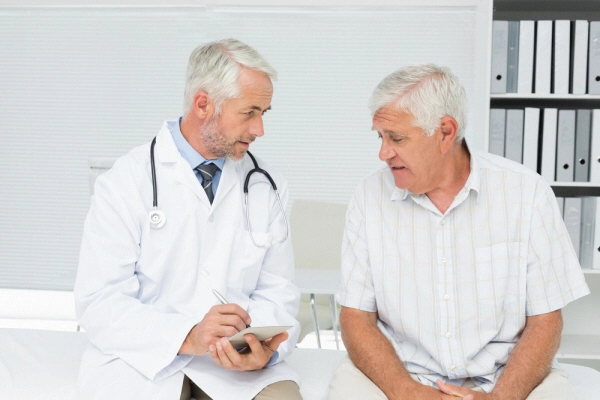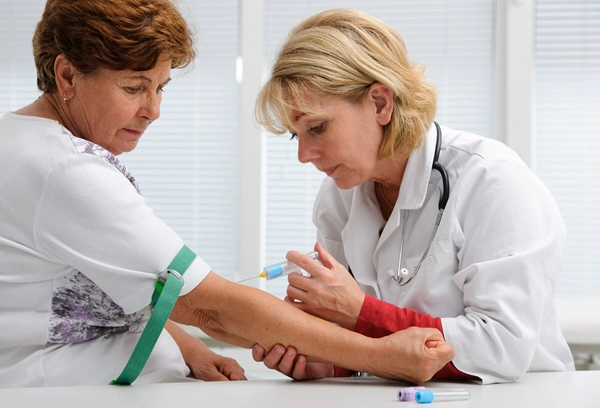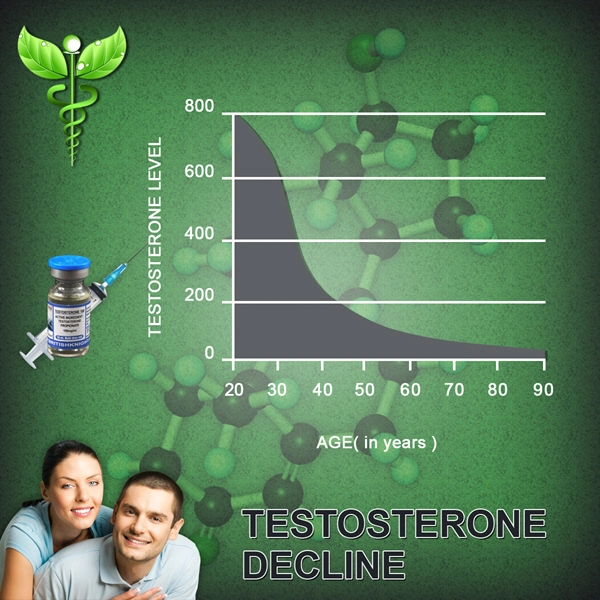Introduction
In the realm of urology, the relationship between testosterone levels and prostate health has been a subject of extensive research. Hypogonadism, characterized by low testosterone levels, has been linked to various health issues, including alterations in prostatic function. This article delves into the specific effects of testosterone on prostatic epithelial cell autophagy in hypogonadal men, offering insights crucial for the management of urological health in this demographic.
Understanding Hypogonadism and Prostate Health
Hypogonadism, a condition where the body does not produce enough testosterone, can have profound effects on male health, including sexual function, muscle mass, and bone density. One less explored area is its impact on the prostate, a gland that is highly sensitive to hormonal fluctuations. Prostatic epithelial cells, which line the prostate gland, are integral to its function and are subject to processes like autophagy, a cellular degradation pathway vital for maintaining cellular health.
The Role of Autophagy in Prostatic Cells
Autophagy is a fundamental process that helps cells remove damaged components and recycle them for energy. In the prostate, autophagy plays a critical role in maintaining cellular homeostasis and preventing the accumulation of dysfunctional proteins and organelles. Dysregulation of autophagy has been implicated in various prostate pathologies, including benign prostatic hyperplasia and prostate cancer.
Testosterone's Influence on Autophagy
Recent studies have begun to unravel the complex interplay between testosterone and autophagy in prostatic epithelial cells. In hypogonadal men, where testosterone levels are low, there appears to be a disruption in the normal autophagic process. This disruption can lead to cellular stress and potentially contribute to the development of prostate diseases.
Modulatory Effects of Testosterone Replacement Therapy
Testosterone replacement therapy (TRT) has been used to treat symptoms of hypogonadism, including sexual dysfunction and fatigue. However, its impact on prostate health, particularly on autophagy, has been a topic of debate. Emerging evidence suggests that TRT can modulate autophagy in prostatic epithelial cells, potentially restoring normal cellular function.
In a study focusing on hypogonadal men, it was found that TRT could enhance autophagic activity in prostatic epithelial cells. This enhancement is believed to be mediated through the activation of androgen receptors, which in turn influence the expression of genes involved in autophagy. The restoration of normal autophagic function could have significant implications for preventing or managing prostate diseases in hypogonadal men.
Clinical Implications and Future Directions
The findings on the modulatory effects of testosterone on prostatic epithelial cell autophagy open new avenues for the clinical management of hypogonadal men. By understanding how TRT can influence cellular processes in the prostate, healthcare providers can better tailor treatments to improve prostate health and overall well-being.
However, further research is needed to fully elucidate the mechanisms by which testosterone influences autophagy and to determine the long-term effects of TRT on prostate health. Future studies should also explore the potential risks and benefits of TRT in different subgroups of hypogonadal men, considering factors such as age, genetic predisposition, and co-existing health conditions.
Conclusion
The relationship between testosterone and prostatic epithelial cell autophagy in hypogonadal men is a critical area of research with significant implications for urological health. Testosterone replacement therapy shows promise in modulating autophagy, potentially offering a therapeutic strategy to maintain prostate health. As research progresses, a deeper understanding of these mechanisms will enhance our ability to manage hypogonadism and its associated health challenges effectively.

- Unraveling the Role of Phosphodiesterase Type 5 in Prostatic Health: Insights into Androgen Regulation and Urological Therapy for American Men [Last Updated On: February 20th, 2025] [Originally Added On: February 20th, 2025]
- Unveiling Testosterone's Impact on Bladder Health Through Electron Microscopy Studies [Last Updated On: March 7th, 2025] [Originally Added On: March 7th, 2025]
- Alpha1-Adrenoreceptor Density, Testosterone, and LUTS Severity in American Men: A Comprehensive Analysis [Last Updated On: March 8th, 2025] [Originally Added On: March 8th, 2025]
- Understanding Urethral Atrophy in Men: Implications, Diagnosis, and Hormone Therapy Options [Last Updated On: March 8th, 2025] [Originally Added On: March 8th, 2025]
- Understanding Prostate Stroma Composition: Implications of Testosterone Normalization on Collagen and Elastin [Last Updated On: March 9th, 2025] [Originally Added On: March 9th, 2025]
- Unveiling the Role of Prostatic Acid Phosphatase in Monitoring Androgen Activity During Testosterone Replacement Therapy [Last Updated On: March 12th, 2025] [Originally Added On: March 12th, 2025]
- Exploring the Impact of Hormone Replacement on Pelvic Floor Function in Hypogonadal Men [Last Updated On: March 12th, 2025] [Originally Added On: March 12th, 2025]
- Exploring Post-Void Residual Volume Changes in Men with Low Testosterone: A Longitudinal Study on Hormone Replacement Therapy [Last Updated On: March 13th, 2025] [Originally Added On: March 13th, 2025]
- Exploring Urinary Proteomics: Unveiling Biomarkers for Lower Urinary Tract Dysfunction in Androgen-Deficient American Men [Last Updated On: March 15th, 2025] [Originally Added On: March 15th, 2025]
- Urinary Flow Cytometry in Hypogonadal Men: Pre- and Post-TRT Cellular Profiles [Last Updated On: March 16th, 2025] [Originally Added On: March 16th, 2025]
- Metabolomic Analysis of Prostatic Fluid in Testosterone-Deficient Men: Urological Insights and Implications [Last Updated On: March 17th, 2025] [Originally Added On: March 17th, 2025]
- TRT's Impact on Prostatic Blood Flow: Insights from Color Doppler Ultrasonography [Last Updated On: March 17th, 2025] [Originally Added On: March 17th, 2025]
- Prostatic Aromatase Activity and Estradiol-Mediated Hyperplasia in Aging Men on TRT [Last Updated On: March 19th, 2025] [Originally Added On: March 19th, 2025]
- Testosterone Deficiency Impacts Mitochondrial Function in Bladder Smooth Muscle of American Men [Last Updated On: March 19th, 2025] [Originally Added On: March 19th, 2025]
- Bladder Wall Thickness Correlates with Urodynamic Parameters in Men with Late-Onset Hypogonadism [Last Updated On: March 20th, 2025] [Originally Added On: March 20th, 2025]
- VUR in Hypogonadal Men: Bladder Neck Dysfunction and Hormonal Impacts [Last Updated On: March 20th, 2025] [Originally Added On: March 20th, 2025]
- Neural Density in Detrusor Muscle: Hypogonadism's Impact on Bladder Function in Men [Last Updated On: March 20th, 2025] [Originally Added On: March 20th, 2025]
- Testosterone Deficiency and Increased Kidney Stone Risk: Urine Sediment Analysis [Last Updated On: March 21st, 2025] [Originally Added On: March 21st, 2025]
- Androgen Therapy Enhances Urethral Pressure in Hypogonadal Men: UPP Insights [Last Updated On: March 21st, 2025] [Originally Added On: March 21st, 2025]
- HRT Impact on Urothelial Gene Expression in American Men: A Transcriptomic Analysis [Last Updated On: March 21st, 2025] [Originally Added On: March 21st, 2025]
- Testosterone Therapy: Monitoring PSA Kinetics and Safety Protocols for Prostate Health [Last Updated On: March 21st, 2025] [Originally Added On: March 21st, 2025]
- Androgen Deficiency Impact on Prostatic Neuroendocrine Cells in American Men: HRT Response [Last Updated On: March 22nd, 2025] [Originally Added On: March 22nd, 2025]
- Prostatic Inflammation in Hypogonadal Men: Histopathology and Testosterone Therapy Insights [Last Updated On: March 22nd, 2025] [Originally Added On: March 22nd, 2025]
- TRT's Impact on Prostate Health: Insights from Transrectal Shear Wave Elastography [Last Updated On: March 22nd, 2025] [Originally Added On: March 22nd, 2025]
- Uroflowmetry and Hormonal Levels in American Men with Androgen Deficiency: A Correlation Study [Last Updated On: March 23rd, 2025] [Originally Added On: March 23rd, 2025]
- Hypogonadism and Non-Bacterial Prostatitis: Inflammatory Profiles and Testosterone Therapy Benefits [Last Updated On: March 23rd, 2025] [Originally Added On: March 23rd, 2025]
- Testosterone Therapy's Impact on Prostatic Stromal-Epithelial Ratio in Hypogonadal Men [Last Updated On: March 23rd, 2025] [Originally Added On: March 23rd, 2025]
- Testosterone's Impact on Prostate Health via Gap Junction Proteins: American Men's Focus [Last Updated On: March 23rd, 2025] [Originally Added On: March 23rd, 2025]
- Quantitative Assessment of Autonomic Innervation in Testosterone-Deficient Neuropathy: Urological Insights [Last Updated On: March 23rd, 2025] [Originally Added On: March 23rd, 2025]
- LOH Impact on Bladder Compliance: Urodynamic and Hormonal Insights for American Males [Last Updated On: March 23rd, 2025] [Originally Added On: March 23rd, 2025]
- Urinary Exosomal microRNAs: Biomarkers for Hypogonadism and LUTS in American Men [Last Updated On: March 24th, 2025] [Originally Added On: March 24th, 2025]
- Prostatic Calcifications in Hypogonadal Men: Prevalence, Composition, and LUTS Association [Last Updated On: March 24th, 2025] [Originally Added On: March 24th, 2025]
- Androgen Deficiency Impacts Bladder Contractility in American Men: Proteomic Insights [Last Updated On: March 24th, 2025] [Originally Added On: March 24th, 2025]
- ART Modulates Apoptotic Index in Prostatic Epithelium of Hypogonadal Men [Last Updated On: March 24th, 2025] [Originally Added On: March 24th, 2025]
- Androgen Receptor Distribution in Hypogonadal Men's Lower Urinary Tract: Immunohistochemical Insights [Last Updated On: March 25th, 2025] [Originally Added On: March 25th, 2025]
- Testosterone's Influence on Bladder ECM Composition in Men: GAGs and Proteoglycans [Last Updated On: March 25th, 2025] [Originally Added On: March 25th, 2025]
- Testosterone Therapy's Impact on Prostate Health: A Histomorphometric Analysis [Last Updated On: March 25th, 2025] [Originally Added On: March 25th, 2025]
- AUM Insights: Testosterone Deficiency and Detrusor Activity in Men [Last Updated On: March 25th, 2025] [Originally Added On: March 25th, 2025]
- TRT's Impact on Prostatic Smooth Muscle: Electron Microscopy Insights [Last Updated On: March 25th, 2025] [Originally Added On: March 25th, 2025]
- Neurophysiological Impact of Testosterone Therapy on Bladder Sensory Afferents in Men [Last Updated On: March 25th, 2025] [Originally Added On: March 25th, 2025]
- TRT Impact on Uroflowmetric Parameters and Serum Hormones in American Males [Last Updated On: March 25th, 2025] [Originally Added On: March 25th, 2025]
- Prostatic Urothelial Metaplasia in Hypogonadism: Prevalence, Pathophysiology, and Testosterone Therapy Reversal [Last Updated On: March 25th, 2025] [Originally Added On: March 25th, 2025]
- Testosterone Fluctuations and Maximum Flow Rate Variability in Hypogonadal Men on TRT [Last Updated On: March 26th, 2025] [Originally Added On: March 26th, 2025]
- Doppler Ultrasonography Monitors Prostatic Flow Changes in Men on TRT [Last Updated On: March 26th, 2025] [Originally Added On: March 26th, 2025]
- PSMA Expression Dynamics in Androgen-Deficient Men Pre- and Post-ART: A Quantitative Analysis [Last Updated On: March 26th, 2025] [Originally Added On: March 26th, 2025]
- Mapping Prostatic Stromal ARs in Men with LUTS: Insights and Therapeutic Implications [Last Updated On: March 26th, 2025] [Originally Added On: March 26th, 2025]
- Testosterone Deficiency Impacts Bladder Function: Insights from Filling Cystometry [Last Updated On: March 27th, 2025] [Originally Added On: March 27th, 2025]
- Testosterone Therapy's Impact on Prostatic Growth Factors and BPH Risk in American Men [Last Updated On: March 27th, 2025] [Originally Added On: March 27th, 2025]
- Urodynamic Insights and Hormone Therapy for Detrusor Overactivity in Testosterone-Deficient Men [Last Updated On: March 27th, 2025] [Originally Added On: March 27th, 2025]
- Hormone Therapy Benefits for Postvoid Dribbling in Testosterone-Deficient American Men [Last Updated On: March 27th, 2025] [Originally Added On: March 27th, 2025]
- DSD in Androgen-Deficient Men: Prevalence, Urodynamics, and Hormonal Management [Last Updated On: March 27th, 2025] [Originally Added On: March 27th, 2025]
- Urethral Sphincter EMG in Hypogonadal Men: Testosterone's Impact on Urinary Function [Last Updated On: March 27th, 2025] [Originally Added On: March 27th, 2025]
- PIN Incidence and Monitoring in Hypogonadal Men on Testosterone Therapy [Last Updated On: March 27th, 2025] [Originally Added On: March 27th, 2025]
- Biochemical Impact of Testosterone Deficiency on Prostatic Secretions in American Males [Last Updated On: March 27th, 2025] [Originally Added On: March 27th, 2025]
- Hypogonadism's Impact on Bladder Neck Collagen and Urodynamics in American Men [Last Updated On: March 28th, 2025] [Originally Added On: March 28th, 2025]
- Bladder Sensation Mapping in Testosterone-Deficient Men: QST Before and After Hormone Therapy [Last Updated On: March 28th, 2025] [Originally Added On: March 28th, 2025]
- Nocturnal Polyuria in Testosterone-Deficient Men: Pathophysiology and Hormone Therapy Benefits [Last Updated On: March 28th, 2025] [Originally Added On: March 28th, 2025]
- TRT Improves Micturition Parameters in Hypogonadal American Men: A Study [Last Updated On: March 29th, 2025] [Originally Added On: March 29th, 2025]
- Neurogenic Bladder in Hypogonadal Men with Metabolic Syndrome: Urodynamic and Hormonal Insights [Last Updated On: March 29th, 2025] [Originally Added On: March 29th, 2025]
- Testosterone Therapy Enhances Detrusor Oxygenation in Androgen-Deficient Men: Polarographic Insights [Last Updated On: March 31st, 2025] [Originally Added On: March 31st, 2025]
- TRT Enhances Urethral Function in Hypogonadal Men: UPP Analysis Insights [Last Updated On: April 1st, 2025] [Originally Added On: April 1st, 2025]
- 3D-TRUS: Monitoring Prostate Health in American Men on Testosterone Therapy [Last Updated On: April 1st, 2025] [Originally Added On: April 1st, 2025]
- Estrogen-Mediated LUTS in Aging Men: Role of Prostatic Stromal Aromatase [Last Updated On: April 3rd, 2025] [Originally Added On: April 3rd, 2025]
- Testosterone Deficiency and Bladder Function: Impact and Improvement via HRT [Last Updated On: April 5th, 2025] [Originally Added On: April 5th, 2025]
- Testosterone Deficiency Impacts Bladder Myofibroblast Activity: Immunohistochemical Insights [Last Updated On: April 5th, 2025] [Originally Added On: April 5th, 2025]
- Prostatic Elastography: Monitoring Prostate Health in American Men on Testosterone Therapy [Last Updated On: April 6th, 2025] [Originally Added On: April 6th, 2025]
- Diurnal LUTS Variations in Hypogonadal Men Linked to Testosterone Rhythms [Last Updated On: April 6th, 2025] [Originally Added On: April 6th, 2025]
- Bladder Wall Fibrosis in Men: Grading and Hormone Therapy Benefits [Last Updated On: April 7th, 2025] [Originally Added On: April 7th, 2025]
- Revolutionizing Prostatic Health: Novel Techniques in Androgen Receptor Sensitivity Assessment [Last Updated On: April 8th, 2025] [Originally Added On: April 8th, 2025]
- Differentiating Prostatitis Symptoms in Hypogonadal Men: Benefits of Testosterone Therapy [Last Updated On: April 8th, 2025] [Originally Added On: April 8th, 2025]
- Intraprostatic T and DHT Levels in American Males Undergoing TRT: Insights and Management [Last Updated On: April 10th, 2025] [Originally Added On: April 10th, 2025]
- OAB in American Men with Low Testosterone: Prevalence, Symptoms, and TRT Benefits [Last Updated On: April 11th, 2025] [Originally Added On: April 11th, 2025]
- Testosterone Deficiency and Bladder Afferent Nerve Activity: Electrophysiological Insights [Last Updated On: April 11th, 2025] [Originally Added On: April 11th, 2025]
- Predicting Prostatic Growth in American Men on TRT Using Mathematical Modeling [Last Updated On: April 12th, 2025] [Originally Added On: April 12th, 2025]
- TRT Enhances Periurethral Vascularity in American Men: Power Doppler Insights [Last Updated On: April 13th, 2025] [Originally Added On: April 13th, 2025]



List of USA state clinics - click a flag below for blood testing clinics.
Word Count: 553



















































